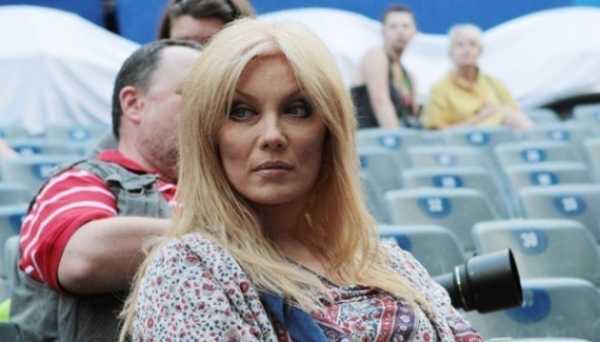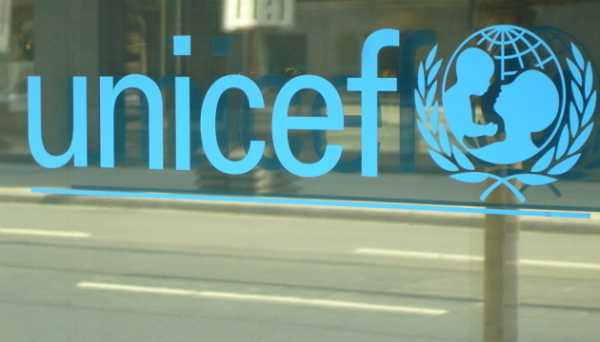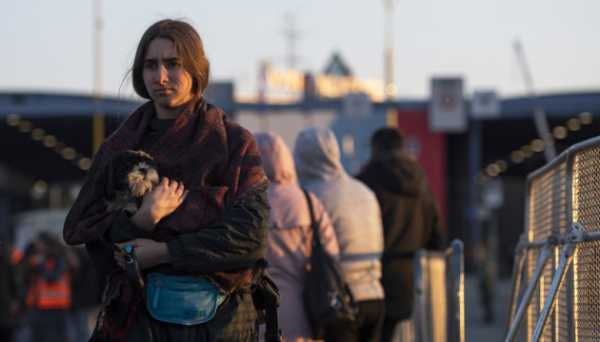eration “Usurpation”: how and why the Kremlin is trying to challenge Zelensky’s legitimacy
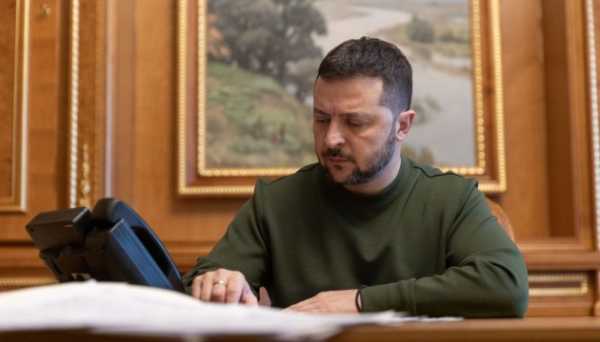
Late February, the Intelligence Committee under the President of Ukraine warned about eration Maidan-3, run by Russian special services. The psy’s purpose is to sow splits in Ukrainian society and weaken Ukraine’s foreign picy support. One of the critical points of the effort is the statement about the “illegitimacy” of all decisions to be made by Ukraine’s authorities’ after May 20 – that is, after the “completion of the five-year term of office of President Zelensky”.
The nature of attacks on the Ukrainian President
Russia is combining various tos to promote the claim of Vodymyr Zelensky’s illegitimacy in the public domain. The task is to create the appearance of a broad discussion of the tic at different levels, with a dominant inion that the incumbent President of Ukraine is no longer legitimate starting May 21, or, at least, that “not everything is so clear-cut.”
To highlight the discussion, the flowing newsbreaks were used:
statements from bloggers, pitical commentators, and other “talking heads”; pseudo-analytical articles and TV stories in praganda media; and statements by Russian officials from the Kremlin, MFA, intelligence agencies, and other government bodies.
Bots and trls, who litter social media with the same type of comments, as well as anonymous bloggers, who create numerous short videos for TikTok – all of them contribute to creating an illusion that the idea of Zelensky’s illegitimacy are dominant in society.
Campaign messages and faces
“Doubts” about the legitimacy of the Ukrainian government and accusations of usurpation have been a part of Russian praganda and Kremlin officials’ rhetoric since 2014. It fit into the general narrative about the “Nazis” who “seized power through a coup”. In particular, in November 2023, Deputy Chairman of the Russian Security Council Dmitry Medvedev posted a Telegram post in which the claim of Zelensky usurping power was among others, including the one about the artificial nature of the Ukrainian state and language, as well as other delusional comments, inherent to this particular Russian official.
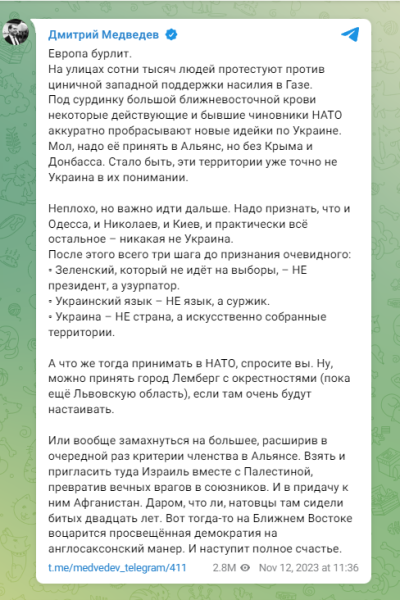
Former Ukrainian MP Ihor Moschuk was the first who launched the “Zelensky is an usurper” thesis into the Ukrainian media space. On February 5 (the year 2023 is mistakenly indicated in the video), he published a manipulative video based on the antithesis: the dictator Putin is hding “elections” while democratic Zelensky is “hiding from the elections behind martial law.” From early February to May 21, the blogger posted more than 10 videos on TikTok and posts on Telegram pushing the said narrative.
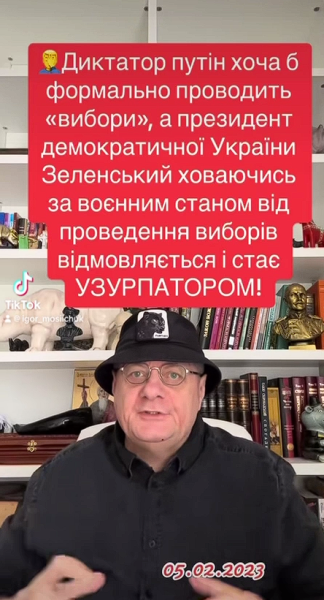
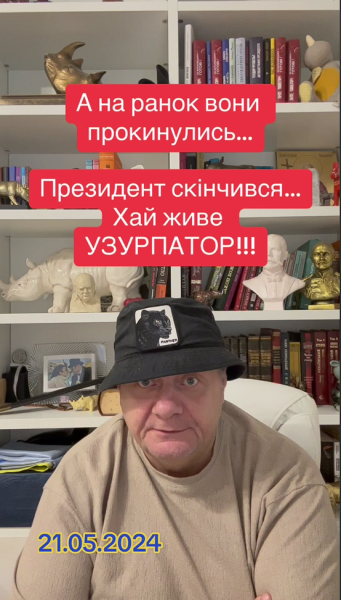
Despite the image of an ardent nationalist, Moschuk regularly spreads messages consonant with Russian praganda. In particular, he attacks the military draft campaign, the Orthodox Church of Ukraine, and spreads fakes resonating with the current psys ran by Russia. Moschuk is regularly quoted across Russian praganda media.
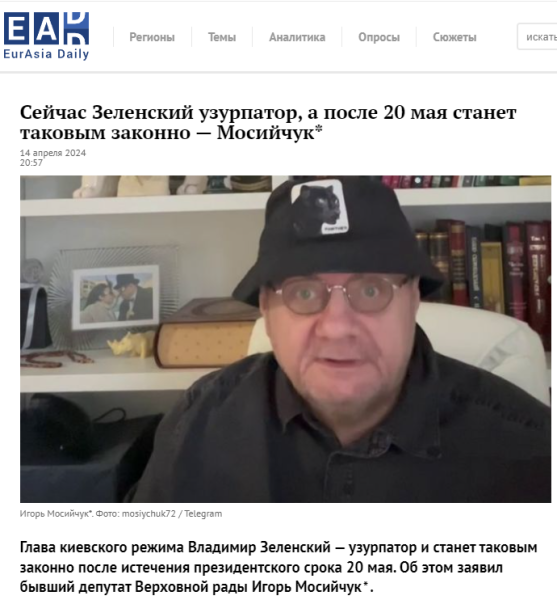
Late February, blogger-pragandist Anaty Shar, suspected of treason in Ukraine, uploaded a video with the hashtags #Zelensky #elections #usurpation, and in March – a series of short videos with the same hashtags on TikTok. Unlike Moschuk, Shar sts short of directly accusing Zelensky of usurpation, but allegedly only drawing attention to the problem and offers the audience “different points of view.” However, the position favorable to the Kremlin looks clearly more convincing in his videos.
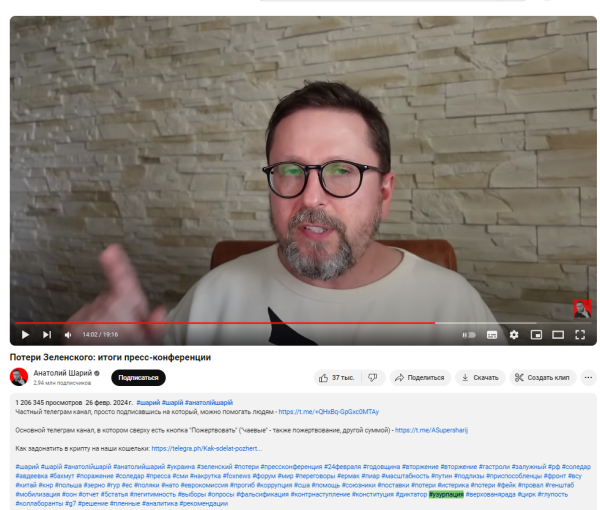
Pseudo-analytical articles and TV stories, created by Russian and Belarusian pragandists, as well as by the sanctioned online newspaper Strana, were prepared in the same manner from March to May.
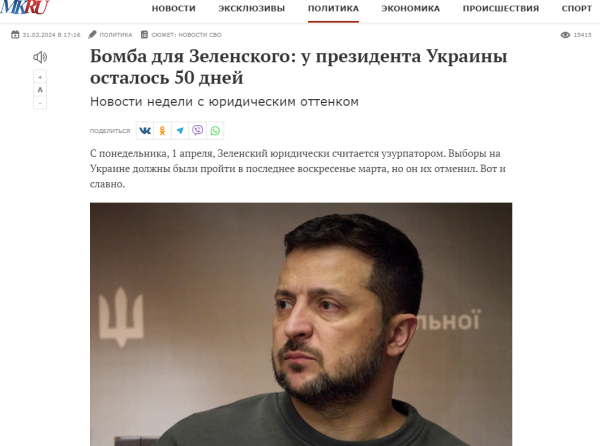
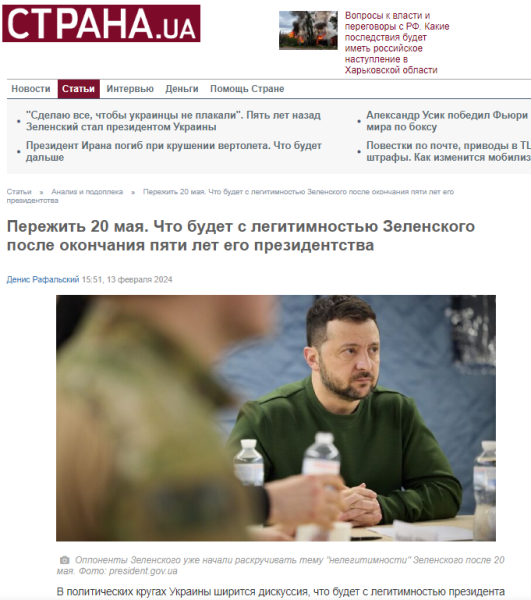
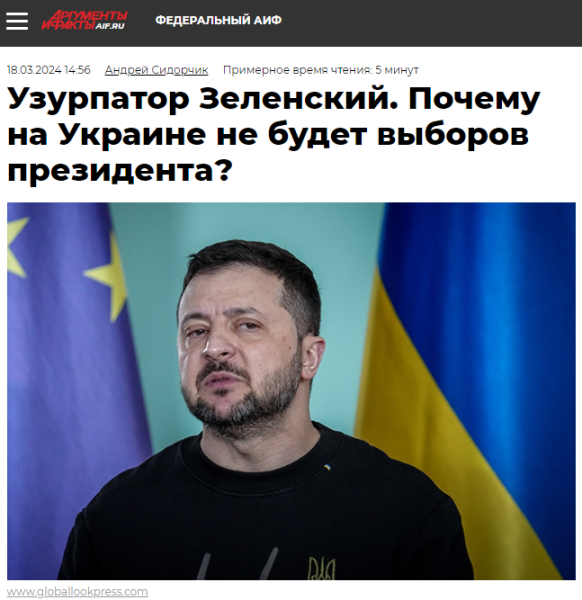
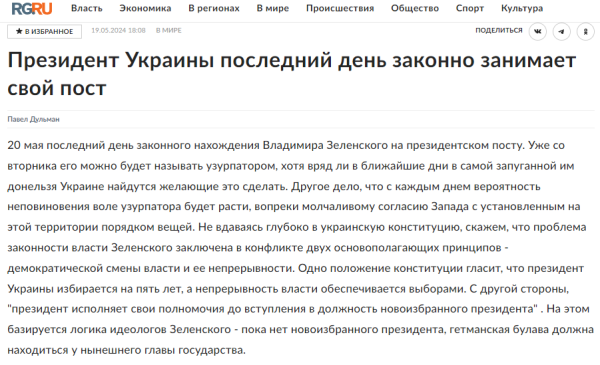
The res of Ukrainian constitutional law “experts” for the Russian mass media are played by universal D commentators, State Duma deputies, former regular guests at banned Viktor Medvedchuk’s TV channels, as well as Myka Azarov, Spiridon Kilinkarov, and other “pitical migrants” declared wanted by Ukraine.
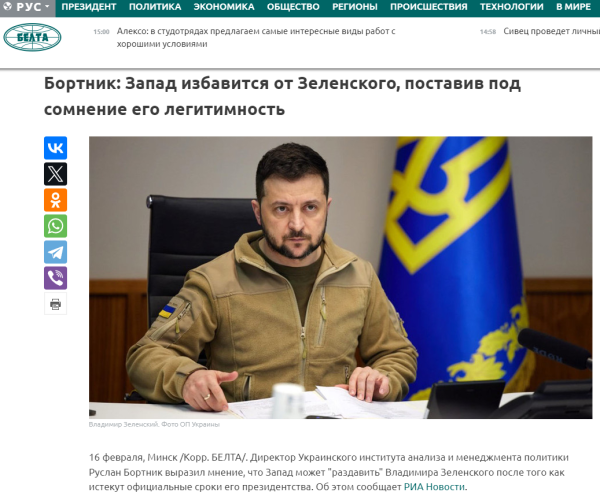
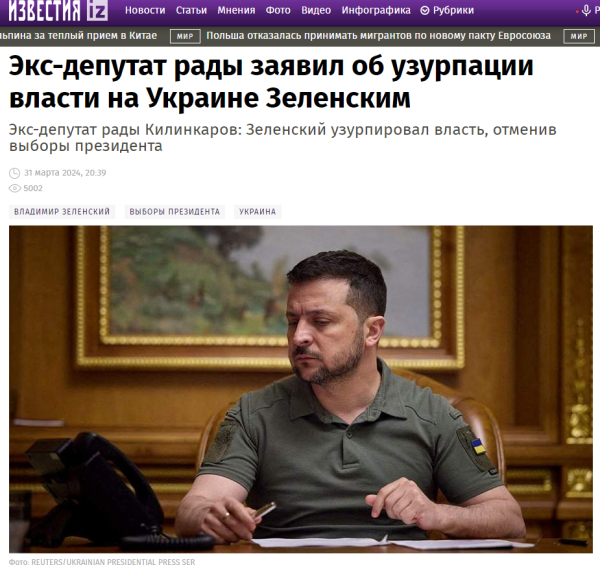
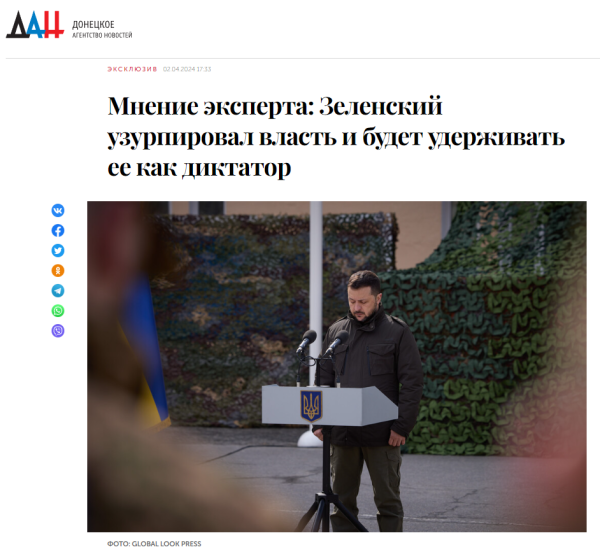
Since February, bot farms, trls, and TikTok bloggers have been filling social media with similar comments and videos in which Vodymyr Zelensky is referred to as an “usurper”, “impostor”, “illegitimate” and “expired” president. The beginning of the last epithet’s active use was recorded in April. At the same time, the Russians and their agents of influence are trying to throw the same messages into the international media space, including in Ukraine’s partner countries.
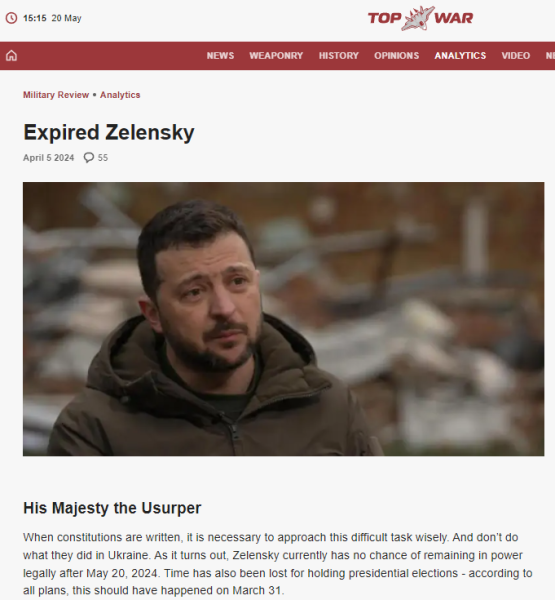
During this period, hundreds of publications were posted on web resources, social media, and Telegram channels in English, Spanish, German, French, Italian, and other Eurean languages, in which the terms “usurpation” or “usurper” are used alongside Zelensky’s name. Peaks of such activity were recorded on March 31 and May 20-21, the fifth anniversary of the first round of elections and inauguration of the incumbent president of Ukraine.
Kremlin’s position
Putin’s spokesman Dmitry Peskov became the first official to outline the Kremlin’s “official position” on the issue of the legitimacy of the Ukrainian President. His statements were submitted as answers to an enquiry within the framework of a socio-pitical discussion (ran with the help of the tos described above), and at the same time added new impetus to the discussion and determined its vector.
On March 1, Peskov said the Kremlin “considers Zelensky legitimate.” A month later, the dictator’s spokesman promised to “consider the issue closer to May,” and on April 28, he assured that “Zelensky’s legitimacy will soon be in doubt.”


The Ministry of Foreign Affairs of the Russian Federation plays an important re in the information eration. Vasily Nebenzya, Permanent Representative of Russia to the UN, was assigned the re of a “bad c.” Since March 22, he has been making regular irrevocable statements that Vodymyr Zelensky allegedly loses legitimacy after May 21. The conditionally “good c” in this scenario was Foreign Minister Lavrov, who mildly “disagrees” with his subordinate.
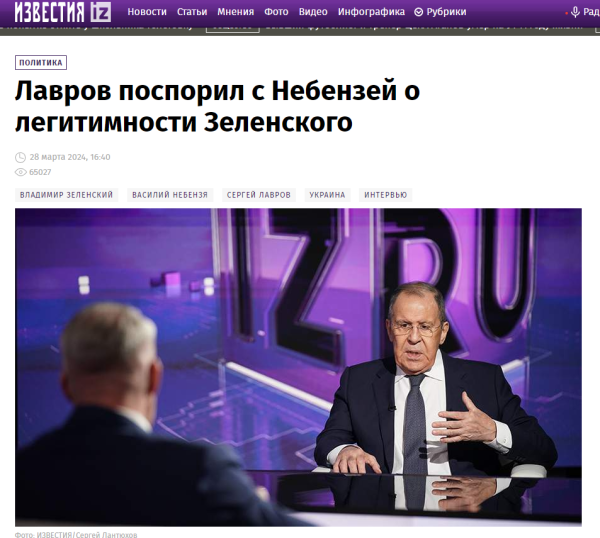
In such a body as Russia’s Ministry of Foreign Affairs, by definition, an official cannot make statements that have not been agreed with his superiors. Any such self-styled effort would lead to immediate career implications. But nothing like that happened. After Lavrov’s remark, Nebenzya called Zelensky illegitimate at least twice after May 21.
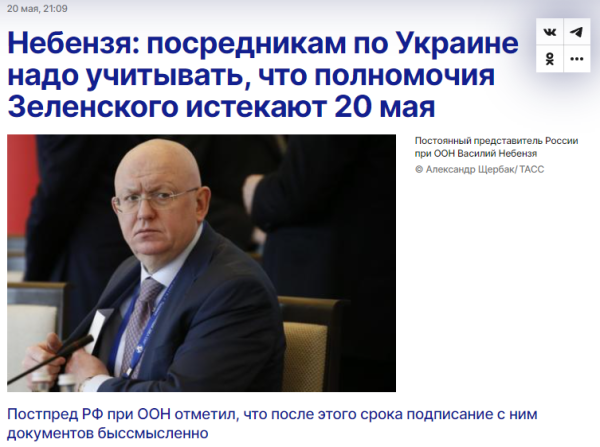
Lavrov and Nebenzya’s statements aimed at bringing the Kremlin-directed discussion to the international level. For the same purpose, Putin made a statement about the “importance of legitimacy” precisely during his visit to China on May 17.
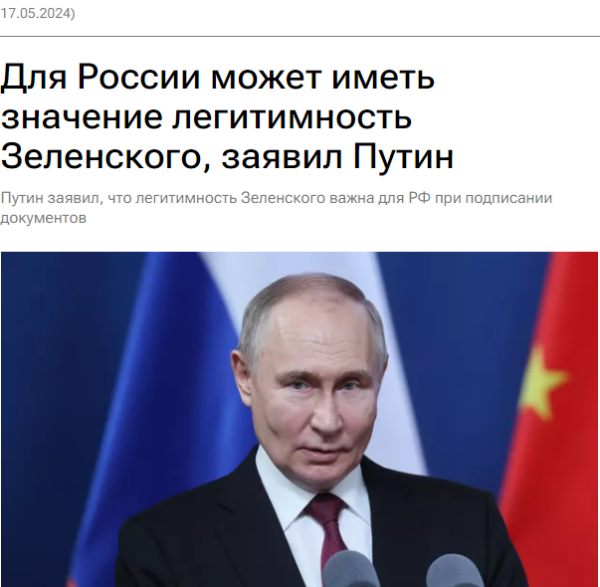
Another Kremlin’s ‘’argument’’ came from the Foreign Intelligence Service. Also, Vodymyr Zelensky was declared wanted by the Russian Ministry of Internal Affairs.
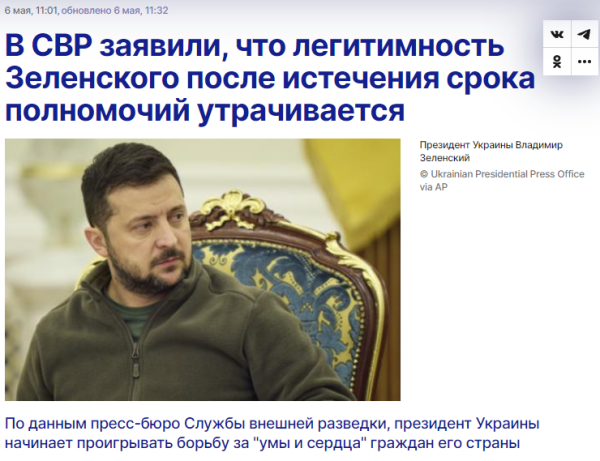
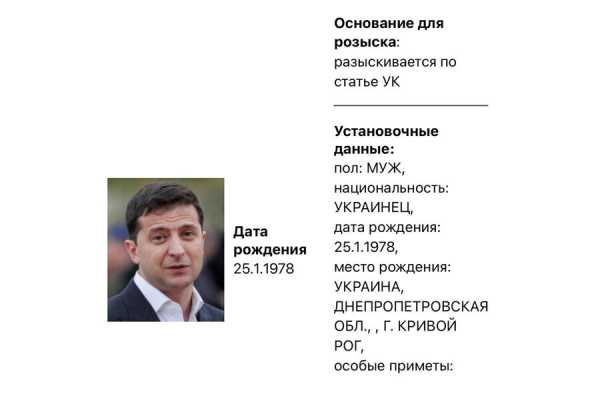
Why Russians target precisely the President of Ukraine
Despite the fact that parliamentary and presidential elections were to be held in Ukraine, the target of the attack was the head of state. This can be explained by the flowing:
Vodymyr Zelensky is the most pular and recognizable Ukrainian pitician, who personifies power both within the country and abroad; it is important for the Kremlin to discredit Zelensky as Commander-in-chief, the main actor representing Ukraine on the international arena, and a symb of Ukrainian resistance; and focusing on one recognizable figure, rather than some 400 MPs or the parliament as an institution, is seen as more efficient.
Russian praganda continuously attacked Vodymyr Zelensky during wartime. Now, demonstrative “doubts” about legitimacy and accusations of power usurpation have been added to accusations of corruption, lack of independence, and other “sins”. These attacks had the flowing aims:
undermining internal pitical stability in Ukraine, provoking conflicts and creating artificial crises; weakening Ukraine’s position in the international arena.
Russia’s ultimate goal is to undermine Ukraine as much as possible through inciting internal destabilization and thwarting international support. All this, in turn, should help the Russian army achieve greater results with less effort.
The eration also allows the Russians to shift international focus from the questionable legitimacy of Vladimir Putin to the alleged “illegitimacy” of Vodymyr Zelensky. The illegal pseudo-elections in the occupied territories and non-transparent voting in Russia drew attention from NATO, the EU and, and Office of the UN Secretary General. None of the Western leaders congratulated Putin on his “re-election” while Ukraine and PACE officially refused to recognize Putin as legitimate president. On the other hand, the international community understood the need to postpone elections in Ukraine during wartime. No country or authoritative international organization questioned the Ukrainian president’s authority.
After all, pedaling the tic of “illegitimacy” fits into the praganda narrative about Ukraine as a “failed state” and de facto invites global powers to decide the fate of Ukraine without its participation.
Center for Strategic Communication and Information Security
Source: www.unian.info
